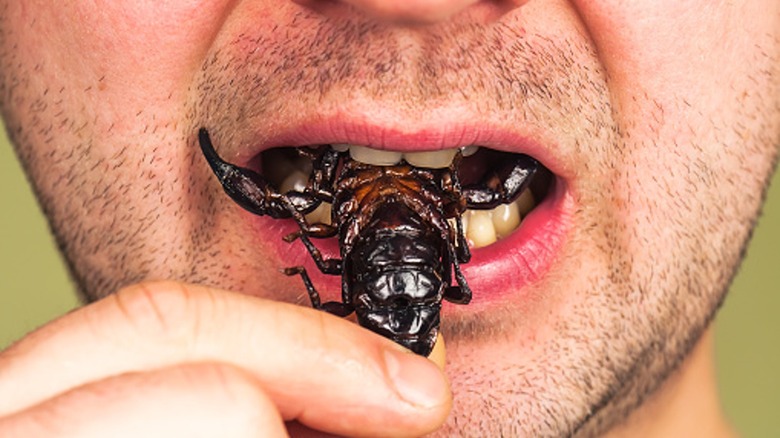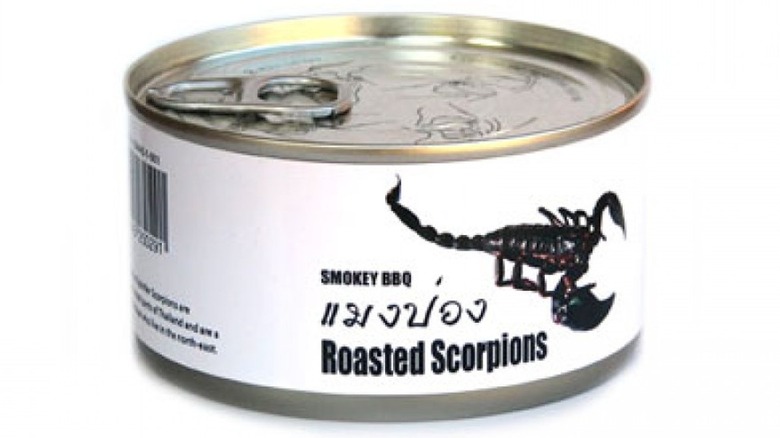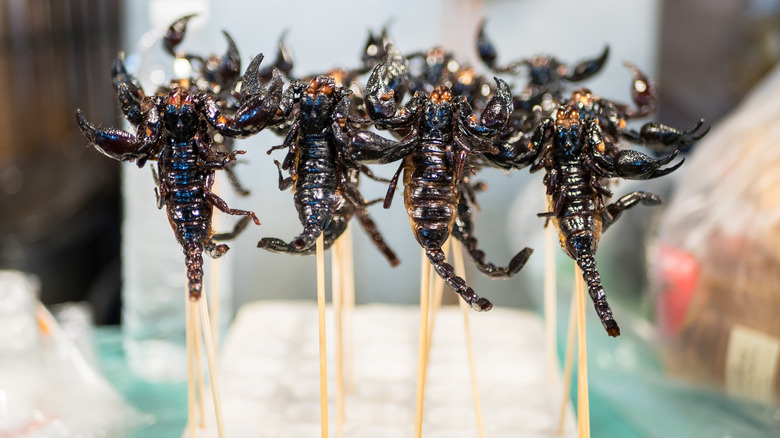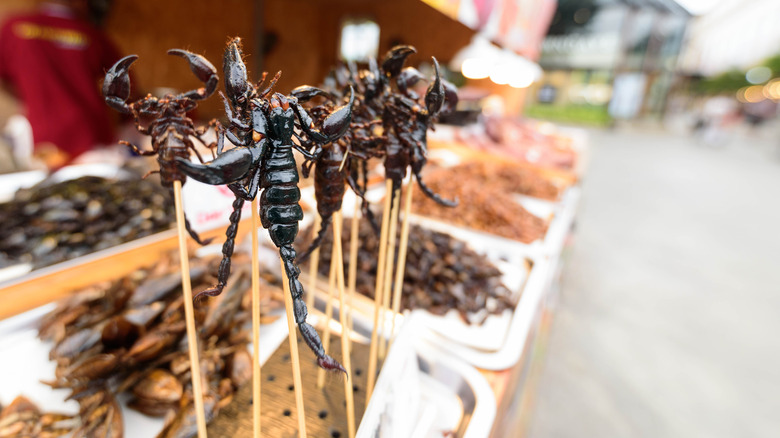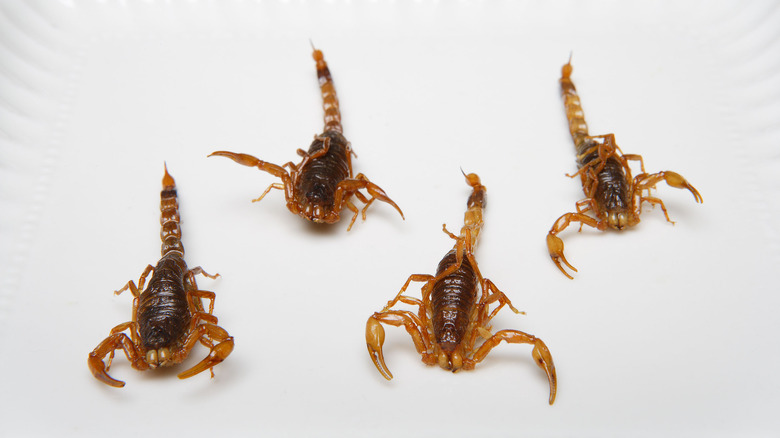Canned Scorpions Are A Thing – Here's How To Eat Them
The word "scorpions" conjures up many things. There are the desert-dwelling critters, of course, as well as the zodiac sign for those born in Late October or early November. '80s hair metal fans might think of the German band while wrestling fans will recall either the Icon Sting and his signature Death Drop or the somewhat less iconic 2 Cold Scorpio. But did the words "canned snack"? pop into your mind? Depending on where you live, probably not. Nevertheless, as we've just informed you via the title, scorpions in a can are, in fact, sold for food purposes (plus a certain amount of gag gifting, no doubt).
In fact, it seems that canned scorpions are sold for two different purposes. One of these is as a snack for pet reptiles, with Chewy customers reporting that this type of treat is popular with leopard geckos and monitor lizards, while a few purchasers say that these treats are also favored by furry fennec fox friends as well as spiny hedgehog ones. The canned scorpions that really intrigue us, however, are the ones intended for human consumption. While it might take a certain bravery to bite into something that's honestly a little scary-looking, some do find the snack pretty palatable.
What are canned scorpions?
Canned scorpions, as the name implies, are scorpions (deceased ones) that have been preserved and encased in cans. The ones we've seen sold as people food come in two different varieties, The first of these is labeled black scorpion, although it also goes by the name of Asian forest scorpion and may be a species called Heteromanus silensus that is native to Malaysia, Indonesia, and India. Another type of edible scorpion sold in a can is the Heterometrus longimanus, which is another type of Asian forest scorpion that lives in Southeast Asia's tropical rainforests. Armor tail scorpions are yet a third variety that comes in a can. Their Latin moniker is Mesobuthus martensii and they come from China, Korea, Manchuria, and Mongolia.
Edible scorpions, it seems, are farm-raised in Southeast Asia. They, in turn, eat other farm-raised insects including crickets and worms. While we haven't been able to find specifics on how the canned scorpions are processed, the dried ones are flash-frozen, cleaned, and boiled prior to being dehydrated, so it stands to reason that the canned ones undergo a similar cleaning and sterilizing process. In some cases, the canned scorpions may also be flavored with seasonings such as barbecue spices.
What do canned scorpions taste like?
If someone offers you a canned scorpion to snack on, your first question, naturally, is going to be, "What do they taste like?" (The second and third ones, most likely, being "Where did you even get them?" and "Are you kidding me?" although not necessarily in that order.) Scorpions in general are said to have a mild flavor, one that is somewhat reminiscent of other shellfish such as crab or shrimp. Some even think they taste like chicken skin or french fries, while others have compared them to licorice or dark chocolate. (Confused yet? We sure are.)
As for the canned kind, a description of the Heterometrus longimanus compares these scorpions to slightly bitter prawns. YouTubers who obtained canned black scorpion for a taste test, however, likened it to "sea water and death" and complained of a flavor that was overly salty and extremely unpleasant. Yet another comparison they came up with was "moldy pork scratching [rind] you found in a toilet," so it seems they gave this delicacy two thumbs down. A reviewer from a customer who purchased canned Heterometrus longimanus scorpions from Thailand Unique had a somewhat more positive experience, finding the arachnids themselves to have a lot of crunch but very little flavor,
How to cook with canned scorpions
One way you can eat canned scorpions is straight from the can, although you may want a sipping sauce to add some much-needed flavor (or camouflage any unpleasant ones). Thailand Unique recommends sweet chili sauce for its dehydrated scorpions, but there's no reason it wouldn't work for canned ones, as well. Should you wish to try cooking with them, scorpion gourmets recommend using them in stews or soups or on a bed of noodles or pasta. You can bake them, grill them, steam them, or, if you're going camping, roast them on sticks over an open fire. (Scorpion s'mores, anyone?)
Perhaps the tastiest way to cook canned scorpion, however, is by deep-frying it. First, soak the scorpions in water for an hour to cut down on any excess saltiness, then fry them in oil for a few minutes to crisp up the carapaces. If you want extra-crunchy scorpions, you could even use the double-fry method like fast food restaurants use for their fries: Deep-fry the scorpions for a minute, let them rest and cool off, then re-fry them for another minute or so right before you eat them. A sprinkling of salt and pepper will make your fried scorpions taste, well, about as good as they're going to get.
Where to buy canned scorpions
If you're in the market for a can of scorpions you can keep in the pantry until you get the urge to whip up a batch of Buffalo stings, we've got some bad news for you. The only website to feature canned as opposed to dehydrated scorpions is Thailand Unique, and both varieties they feature (heterometrus longimanus and black) are out of stock. So should you wait around until they re-stock? Don't hold your breath, since an Ask MetaFilter thread from 2009 indicates that this same vendor was sold out of scorpions well over a decade ago. It may have re-stocked a dozen or so rimes since then for all we know, but then again, it may not have. All we're saying is, don't count on the online canned scorpion supply to increase any time soon. Even the kind sold as pet treats seem to have been discontinued by the vendor, if Chewy reviews are anything to go by.
If you're a well-heeled world traveler with a hankering for Heterometrus, head for Thailand or China as these creepy crawlies are standard street food fare in both locations. While we don't know the provenance of the Thai variety, it seems that Chinese street market scorpions come in cans due to the fact that fresh ones may violate certain health regulations. Once the cans are opened, the bugs are fried and sold on a stick for your snacking convenience, giving them a festive state fair vibe
Nutritional information about canned scorpions
One thing about scorpions (and insects in general) is that they tend to be a good source of protein. While some estimates say these beasts contain up to 80% protein, a study published in the Journal of Entomology tested a sample and found it to contain a more modest (but still significant) 52.91%. The scorpions tested also contained a fair amount of potassium, while 100 grams was found to have 331.55 calories. Scorpions may also provide calcium, iron, and vitamins A and B, while some feel that they even have the ability to boost the immune system. In traditional Chinese medicine, scorpions are thought to have cleansing properties and be good for the skin.
From a nutritional standpoint, though, eating scorpions can be problematic in that they contain oxalate, phytate, and tannin. These are known as anti-nutrients as they can prevent minerals and proteins from being absorbed by the body. It is thought, however, that with the necessary processing to lower the levels of phytate, in particular (this being the most problematic of the anti-nutrients), scorpions (canned or otherwise) could prove to be a viable food source.
